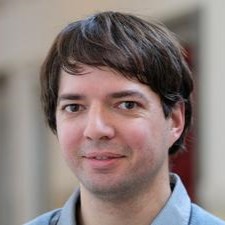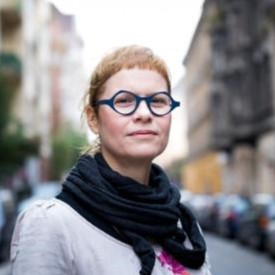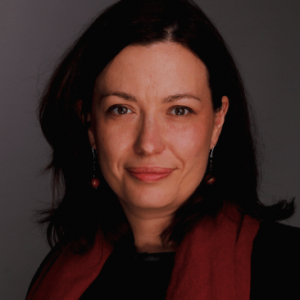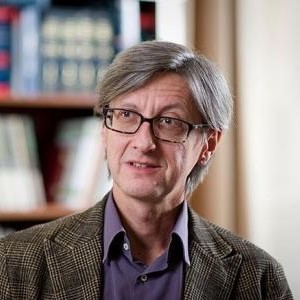
In this special online panel, five scholars of contemporary Europe will discuss Timothy Garton Ash’s Homelands. A Personal History of Europe with the author.
The discussion will be streamed live on YouTube. Follow it here.
Commentators:
- Felix Ackermann (FernUniversität in Hagen)
- Celia Donert (University of Cambridge)
- Ferenc Laczó (Maastricht University/Review of Democracy)
- Renáta Uitz (Central European University/CEU Democracy Institute)
- Joanna Wawrzyniak (University of Warsaw)
Moderator:
- László Kontler (Central European University/CEU Democracy Institute)
About the speakers:
 Timothy Garton Ash is Professor of European Studies in the University of Oxford, Isaiah Berlin Professorial Fellow at St Antony's College, Oxford, and a Senior Fellow at the Hoover Institution, Stanford University. At St Antony's, he also directs the Dahrendorf Programme for the Study of Freedom. He is the author of ten books of political writing or ‘history of the present’ including The Magic Lantern: The Revolution of ’89 Witnessed in Warsaw, Budapest, Berlin, & Prague, The File: A Personal History, In Europe’s Name, Facts are Subversive and Free Speech: Ten Principles for a Connected World. He writes a column on international affairs in the Guardian, which is widely syndicated, and is a regular contributor to the New York Review of Books, amongst other journals. Awards he has received for his writing include the Somerset Maugham Award, Prix Européen de l'Essai and George Orwell Prize. In May 2017 he was awarded the International Charlemagne Prize of the city of Aachen.
Timothy Garton Ash is Professor of European Studies in the University of Oxford, Isaiah Berlin Professorial Fellow at St Antony's College, Oxford, and a Senior Fellow at the Hoover Institution, Stanford University. At St Antony's, he also directs the Dahrendorf Programme for the Study of Freedom. He is the author of ten books of political writing or ‘history of the present’ including The Magic Lantern: The Revolution of ’89 Witnessed in Warsaw, Budapest, Berlin, & Prague, The File: A Personal History, In Europe’s Name, Facts are Subversive and Free Speech: Ten Principles for a Connected World. He writes a column on international affairs in the Guardian, which is widely syndicated, and is a regular contributor to the New York Review of Books, amongst other journals. Awards he has received for his writing include the Somerset Maugham Award, Prix Européen de l'Essai and George Orwell Prize. In May 2017 he was awarded the International Charlemagne Prize of the city of Aachen.
 Felix Ackermann is Professor of Public History, and Academic Director of the Institute for History and Biography at FernUniversität in Hagen. He graduated in cultural studies, history and political science in Frankfurt (Oder) and London. From 2000 to 2011, he set up the Institute for Applied History at the European University Viadrina, and subsequently taught Applied Humanities at the European Humanities University in Vilnius. Between 2016 and 2022 he was research fellow at the German Historical Institute Warsaw. He also held fellowships at Center for Urban History, Lemberg, and Institute for Human Sciences (IWM) in Vienna. He publishes regularly in journals, such as the Frankfurter Allgemeine Zeitung or the Neue Zürcher Zeitung
Felix Ackermann is Professor of Public History, and Academic Director of the Institute for History and Biography at FernUniversität in Hagen. He graduated in cultural studies, history and political science in Frankfurt (Oder) and London. From 2000 to 2011, he set up the Institute for Applied History at the European University Viadrina, and subsequently taught Applied Humanities at the European Humanities University in Vilnius. Between 2016 and 2022 he was research fellow at the German Historical Institute Warsaw. He also held fellowships at Center for Urban History, Lemberg, and Institute for Human Sciences (IWM) in Vienna. He publishes regularly in journals, such as the Frankfurter Allgemeine Zeitung or the Neue Zürcher Zeitung
 Celia Donert is Associate Professor in Central European History, Director of Research (Projects) for the History Faculty, and Fellow of Wolfson College at the University of Cambridge. Her research focuses on the history of contemporary Europe, particularly Central Europe. She received her PhD from the European University Institute, after studying at Oxford University and the School of Slavonic and East European Studies, University of London. Before arriving in Cambridge in 2019, she taught for seven years at the University of Liverpool, where she was promoted to Professor in 2018. She was Visiting Professor at the University of Vienna, visiting fellow at the Free University, Berlin, and held fellowships at the ZZF in Potsdam, the Wissenschaftszentrum Berlin, the ÉHÉSS in Paris, the Slovak Academy of Sciences in Bratislava, and the Czech Academy of Sciences in Prague. With Martin Conway and Kiran Patel, she is the editor of the Cambridge University Press book series European Histories of the Present, co-editor of Contemporary European History, and an editorial board member of the Journal of Contemporary History, Social History, and Historický časopis.
Celia Donert is Associate Professor in Central European History, Director of Research (Projects) for the History Faculty, and Fellow of Wolfson College at the University of Cambridge. Her research focuses on the history of contemporary Europe, particularly Central Europe. She received her PhD from the European University Institute, after studying at Oxford University and the School of Slavonic and East European Studies, University of London. Before arriving in Cambridge in 2019, she taught for seven years at the University of Liverpool, where she was promoted to Professor in 2018. She was Visiting Professor at the University of Vienna, visiting fellow at the Free University, Berlin, and held fellowships at the ZZF in Potsdam, the Wissenschaftszentrum Berlin, the ÉHÉSS in Paris, the Slovak Academy of Sciences in Bratislava, and the Czech Academy of Sciences in Prague. With Martin Conway and Kiran Patel, she is the editor of the Cambridge University Press book series European Histories of the Present, co-editor of Contemporary European History, and an editorial board member of the Journal of Contemporary History, Social History, and Historický časopis.
 Ferenc Laczó is Assistant Professor with tenure at Maastricht University, and Editor of the Review of Democracy. He received his PhD from the Central European University and was previously employed as a postdoctoral researcher at the Imre Kertész Kolleg Jena. He is the author or editor of eleven books on Hungarian, Jewish, German, European, and global themes. His main research interests lie in political and intellectual history, modern and contemporary European and global history, the history of mass violence, and questions of history and memory. He teaches primarily in European Studies and contributes to liberal arts in Maastricht. His writings have appeared in fifteen languages.
Ferenc Laczó is Assistant Professor with tenure at Maastricht University, and Editor of the Review of Democracy. He received his PhD from the Central European University and was previously employed as a postdoctoral researcher at the Imre Kertész Kolleg Jena. He is the author or editor of eleven books on Hungarian, Jewish, German, European, and global themes. His main research interests lie in political and intellectual history, modern and contemporary European and global history, the history of mass violence, and questions of history and memory. He teaches primarily in European Studies and contributes to liberal arts in Maastricht. His writings have appeared in fifteen languages.
 Renáta Uitz is Professor of Comparative Constitutional Law at the CEU Department of Legal Studies and Co-Director of the CEU Democracy Institute. Her major research interests lie in transition to and from democracy, the protection of individual autonomy and religious liberty. Her current work focuses on illiberal constitutional practices and the normalization of illiberal constitutionalism. She is a co-PI in the Jean Monnet Network BRIDGE. As a co-PI in the multidisciplinary research network investigating the origins and iterations of illiberal constitutionalism in East Central Europe, funded by the Volkswagen Stiftung (2021-25), her work traces the emergence of illiberal Christian democracy. Her book publications include Routledge Handbook of Illiberalism (co-edited with András Sajó and Stephen Holmes (Routledge 2021)) and The Constitution of Freedom: An Introduction to Legal Constitutionalism(OUP 2017).
Renáta Uitz is Professor of Comparative Constitutional Law at the CEU Department of Legal Studies and Co-Director of the CEU Democracy Institute. Her major research interests lie in transition to and from democracy, the protection of individual autonomy and religious liberty. Her current work focuses on illiberal constitutional practices and the normalization of illiberal constitutionalism. She is a co-PI in the Jean Monnet Network BRIDGE. As a co-PI in the multidisciplinary research network investigating the origins and iterations of illiberal constitutionalism in East Central Europe, funded by the Volkswagen Stiftung (2021-25), her work traces the emergence of illiberal Christian democracy. Her book publications include Routledge Handbook of Illiberalism (co-edited with András Sajó and Stephen Holmes (Routledge 2021)) and The Constitution of Freedom: An Introduction to Legal Constitutionalism(OUP 2017).
 Joanna Wawrzyniak is a sociologist and historian, specializing in East-Central European memory processes. She is Associate Professor and Director of the Center for Research on Social Memory at the Faculty of Sociology at University of Warsaw. Her current projects include research on memories of socialism, neoliberal transformation, and deindustrialization in Poland and contributions to collaborative research on cultural heritage and memory processes in Eastern Europe, Western Europe and East and South Asia. Joanna has long standing expertise in oral history and museum research. She has published, among others, in Heritage and Society; Memory Studies; Contemporary European History; East European Politics and Societies; and Polish Sociological Review. Her books in English include co-edited Memory and Change in Europe: Eastern Perspectives (2016); co-authored The Enemy on Display: The Second World War in Eastern European Museums (2015); and Veterans, Victims and Memory: The Politics of the Second World War in Communist Poland (2015).
Joanna Wawrzyniak is a sociologist and historian, specializing in East-Central European memory processes. She is Associate Professor and Director of the Center for Research on Social Memory at the Faculty of Sociology at University of Warsaw. Her current projects include research on memories of socialism, neoliberal transformation, and deindustrialization in Poland and contributions to collaborative research on cultural heritage and memory processes in Eastern Europe, Western Europe and East and South Asia. Joanna has long standing expertise in oral history and museum research. She has published, among others, in Heritage and Society; Memory Studies; Contemporary European History; East European Politics and Societies; and Polish Sociological Review. Her books in English include co-edited Memory and Change in Europe: Eastern Perspectives (2016); co-authored The Enemy on Display: The Second World War in Eastern European Museums (2015); and Veterans, Victims and Memory: The Politics of the Second World War in Communist Poland (2015).
 László Kontler is Pro-Rector for Budapest and KEE at Central European University, Director of the Doctoral Program at the CEU Department of History, and Research Affiliate at the CEU Democracy Institute. He held visiting positions and fellowships at Rutgers, Oxford, Cambridge, Edinburgh, Wolfenbüttel, Göttingen and the European University Institute (Florence). His research and publications focus on intellectual history, the history of political thought, translation and reception, and the production and circulation of scientific knowledge in early modern Europe, mainly the Enlightenment. His books include A History of Hungary (Palgrave, 2002), Translations, Histories, Enlightenments: William Robertson in Germany, 1760-1795 (Palgrave, 2014) and (with Per Pippin Aspaas) Maximilian Hell (1720-1792) and the Ends of Jesuit Science in Enlightenment Europe (Brill, 2020).
László Kontler is Pro-Rector for Budapest and KEE at Central European University, Director of the Doctoral Program at the CEU Department of History, and Research Affiliate at the CEU Democracy Institute. He held visiting positions and fellowships at Rutgers, Oxford, Cambridge, Edinburgh, Wolfenbüttel, Göttingen and the European University Institute (Florence). His research and publications focus on intellectual history, the history of political thought, translation and reception, and the production and circulation of scientific knowledge in early modern Europe, mainly the Enlightenment. His books include A History of Hungary (Palgrave, 2002), Translations, Histories, Enlightenments: William Robertson in Germany, 1760-1795 (Palgrave, 2014) and (with Per Pippin Aspaas) Maximilian Hell (1720-1792) and the Ends of Jesuit Science in Enlightenment Europe (Brill, 2020).